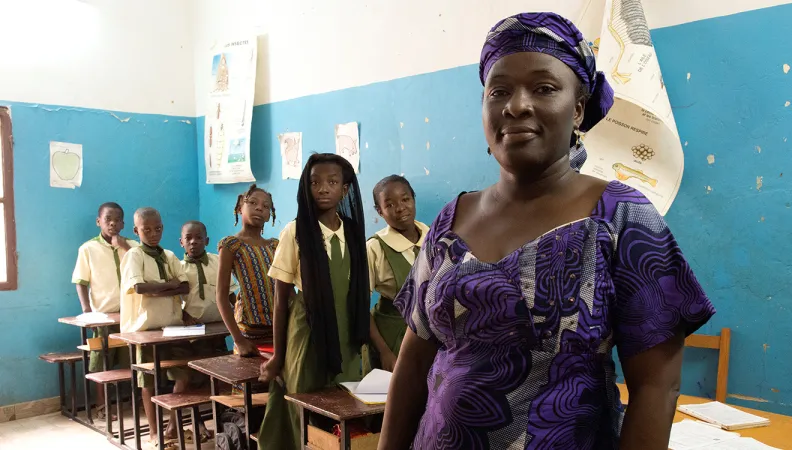Share the page
Niger: Restoring an Education System Hit Hard by Covid
Published on

To slow the spread of the Coronavirus in the spring of 2020, Niger closed its schools. That decision has not been without consequences. The education of many children ground to a halt. Now, swift action is being taken: with support from AFD, UNICEF and the Global Partnership for Education, the authorities have launched a plan to support and restore the education system.
In Niger, when schools closed in the spring of 2020 to curb the spread of Covid-19, some 3.7 million students were left without access to education. Nor was the internet any alternative: only 10% of Nigerien households are estimated to have access.
“Children don’t have textbooks to work at home and parents don’t necessarily have the level of education required to help them,” says Audrey Martinenq Duplessis, Education and Training project team leader at AFD.
Related services have also been suspended, including school catering, which provides many children with the only balanced meal of the day. And with the prolonged absence from school, the greatest risk that children drop out altogether. Already, “45% of children don’t go to school,” says Julie Maline, Education Officer at AFD in Niamey. “Nine children in ten who complete the fourth grade don’t have basic knowledge in literacy and math.”
Humanitarian assistance and Development
The Nigerien authorities rapidly prepared a plan to support the education system: the Global Partnership for Education released €11 million, while AFD and UNICEF have been mandated to implement this financing, part of which is channeled through the Education Sector Pooled Fund. This fund, with some $132 million raised by Swiss Cooperation, Luxembourg Cooperation, UNICEF and AFD, aims to bolster Niger's education system.
The objective of this program, which is being implemented over an 18-month period (July 2020 to December 2021), is “at the crossroads of humanitarian aid and development”, says Julie Maline. In the short term, it will install emergency measures to minimize permanent school dropouts of vulnerable students.
Tangible results
In the longer term, the objective is to improve the quality of the education system.
“This approach allows us to initiate a high-level dialogue with the Nigerien authorities based on three areas: reducing inequalities in access to education between urban and rural areas and between girls and boys; improving learning, with a focus on reading, writing and numeracy; and making the governance of the education system more effective,” says Audrey Martinenq Duplessis.
The first priority is to target students with the highest risk of dropping out, especially those living in rural areas, as well as girls and students in the first years of primary education.
Educational continuity
Thousands of textbooks, exercise books and other teaching materials have been printed and distributed. “We’ve managed to distribute math and French materials to all primary school students. In the 5th and 6th grades, there is now one textbook per two students compared to one per five or seven before,” says Julie Maline.
Phone credit has been provided, allowing teachers to monitor their students at a distance, and lessons are broadcast on the radio. Having been tested in a few regions, broadcast lessons will be scaled up in 2021, with the help of UNICEF, which is to distribute 75,000 radios.
The goal is to encourage the most vulnerable, return to school. The program includes the distribution of food rations, menstrual hygiene kits for girls and over 10,000 hand-washing kits in 6,000 schools. Communication campaigns announce the reopening of schools and raise awareness of the protective measures.
The coordinated program has also focused on developing teachers’ skills. They have had additional training in the organization of teaching during disrupted periods and in adapting their lessons to suit the difficulties of children who may be refugees, from displaced families or suffering from post-traumatic stress disorder.
“The pandemic as an accelerator of change”
The efforts are paying off. Some 670,000 children went back to school at the start of the school year, according to an evaluation conducted by UNICEF. Now, the hope is that these benefits extend beyond the school walls.
“The pandemic has acted as an accelerator of change,” says Audrey Martinenq Duplessis. “In countries with limited resources and an ever-increasing number of children to enrol in school, we need to come up with innovative alternatives that complement the school model, and address these new challenges.”
